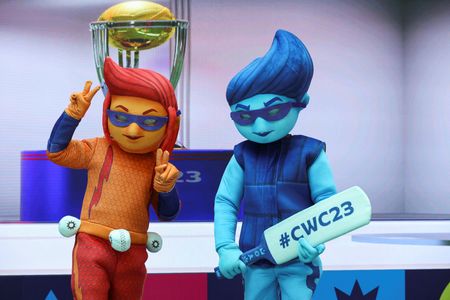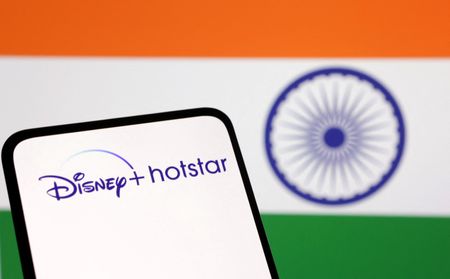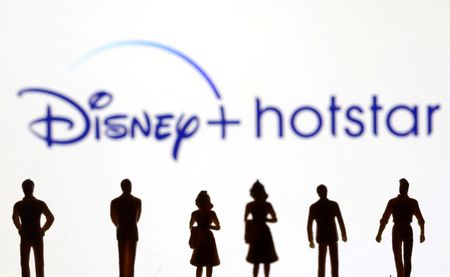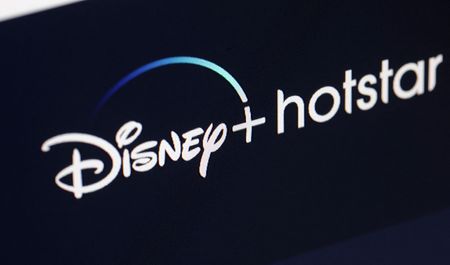By Aditya Kalra, Munsif Vengattil and Dawn Chmielewski
NEW DELHI/LOS ANGELES (Reuters) – Walt Disney is attempting to revive the fortunes of its streaming business in India by offering free cricket on smartphones, betting that the strategy will boost advertising revenue and offset the impact of a subscriber exodus.
The India streaming operations, which were Disney’s biggest last year globally by users, posted a loss of $41.5 million on revenue of $390 million for the year to March 2022, its last disclosed results.
With subscriber exits accelerating and slashing the user base by a third between October last year and July, the Burbank-headquartered entertainment giant’s financial performance in the country is only expected to come under more pressure.
Disney’s woes are a cautionary tale about the Indian market where expectations about a swelling middle-class are often frustrated by deeply cost-conscious consumers.
The company acquired Indian streaming service Hotstar when it paid $71 billion for some 21st Century Fox global assets in 2019. With the streaming rights of the Indian Premier League (IPL), the world’s richest cricket league, in the bag, Disney made cricket on Hotstar a paid service in 2020 and was confident about garnering up to 100 million users within years.
But Indian billionaire Mukesh Ambani snatched IPL rights away in a $2.9 billion bid last year, and then streamed games for free. Soon, Disney subscribers fled – out of 61 million users in October, roughly 21 million had left by July.
Disney internally recognises it misjudged Indians’ willingness to pay – people signed up for Hotstar when it had IPL, but didn’t stick around to buy more premium plans to watch other content, two Disney sources told Reuters.
“We were bullish on Indian subscribers’ propensity to pay. That’s not worked out,” said one of the sources. “Free cricket is the only bullet left.”
The company will stream live matches of the Asia Cup from Aug. 30 as well as the World Cup in October-November that users of 600 million smartphones in the cricket-mad nation can watch without paying anything.
The new strategy comes as Disney is also exploring options of finding a joint venture partner or even a sale of its India business.
‘HYBRID MODEL’
Disney renewed its rights to show the International Cricket Council’s tournaments in India from 2024 to 2027 by paying around $3 billion. It retains digital streaming rights but last year licensed the TV broadcast rights to Indian’s Zee Entertainment for around $1.5 billion, a source said.
The company has assessed that going back to the free-cricket model on mobile phones and tablets is the strategic pivot needed to shore up revenues. It calls the move a new “hybrid model” to drive advertising revenues by raising smartphone viewers, while targeting new subscribers for the Hotstar TV app where cricket will remain under paid plans.
This strategy is about “how we build a model which will allow us to drive two revenue streams more meaningfully,” Sajith Sivanandan, head of Disney+ Hotstar, said in an interview, adding Disney was confident its user base will grow in the years ahead.
Making cricket free on mobile will help “450 million-plus customers to tune in” over 48 days of the 50-over World Cup that is being hosted by India, compared to 300 million in the last World Cup in 2019, stated a “Festival of Cricket 2023” Disney presentation created for advertisers and seen by Reuters.
The company is eyeing a new record of 50 million concurrent viewership during the World Cup, double the 2019 number, the document added. That will also be 56% higher than what Ambani’s JioCinema clocked during this year’s IPL finals in May.
Sivanandan said the company would target advertisers with budgets as low as 200,000 rupees ($2,421). Another new initiative would be interactive ads connecting watchers to a brand’s WhatsApp chat to enable purchases of the products.
The Disney document showed a new deal struck with Coca-Cola for boosting subscriptions. QR codes on an estimated 400 million Coke bottles will offer a Hotstar trial, with Disney hoping 80,000 people will then take paid plans.
LOW AVERAGE REVENUE
There is no guarantee, though, that Disney’s strategy pivot will succeed.
Daoud Jackson, a senior analyst specialising in streaming businesses at UK research firm Omdia, said free cricket was not a sure shot winner as companies pay billions of dollars to get streaming rights but commensurate advertising revenue takes many years to materialise.
While India’s middle class is massive, the broad user base in the world’s most populous country “narrows sharply” when it comes to paying users, VC firm Blume Ventures said in April.
In the United States, ad-free Disney+ streaming service subscription rates are set to rise by 27% to $13.99 per month. By contrast in India, Disney+ Hotstar service costs $3.62 a month.
The average revenue per user (ARPU) is very low in India at just $0.59, compared to Disney+ U.S. service’s $7.31, according to Disney’s latest quarterly earnings report.
Disney’s global leadership has put pressure on India to speed up the “path to profitability” for Hotstar. CEO Bob Iger’s Chief of Staff, Nancy Lee, visited the country earlier this year and questioned the business leaders if streaming operations can be profitable before the end-2024 global target, sources said.
She was told advancing of the target will not be possible.
Still, research firm Media Partners Asia estimated last year India’s streaming market will be worth $7 billion by 2027, where Netflix and Amazon.com’s Prime Video will also be competing. But it is the rivalry with JioCinema, run by Ambani’s broadcast unit Viacom18, that could be the most intense.
As Ambani promoted IPL on his streaming apps around March, he focused on how people can watch matches on the go on smartphones, and do not need a TV. To counter that, Disney at the time rolled out ads saying cricket was best watched on TV – for which it still has IPL rights.
In new ad campaigns last week, Disney changed tack.
“Now watch all matches of the world’s biggest tournaments, anywhere, on your mobile, absolutely free,” it said.
($1 = 82.6100 Indian rupees)
(Reporting by Aditya Kalra in New Delhi, Munsif Vengattil in Bengaluru and Dawn Chmielewski in Los Angeles; Editing by Muralikumar Anantharaman)




